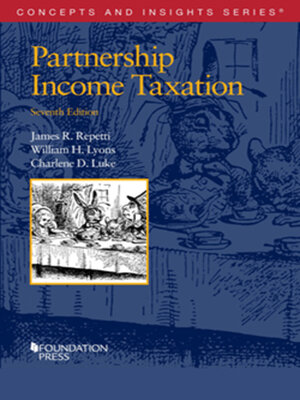
Sign up to save your library
With an OverDrive account, you can save your favorite libraries for at-a-glance information about availability. Find out more about OverDrive accounts.
Find this title in Libby, the library reading app by OverDrive.



Search for a digital library with this title
Title found at these libraries:
| Library Name | Distance |
|---|---|
| Loading... |
This book provides the simplest possible introduction of partnership taxation to students and beginning practitioners trying to understand the taxation of partnerships. Partnership taxation is an intricate body of law with the result that any "simplified" description of its rules would be so misleading as to be useless. We have therefore tried to make the subject accessible not by paraphrasing the rules, but by including over one hundred and forty examples of the rules that are as straightforward as possible. The text and examples focus on simple partnerships and limited liability companies that hold few assets and engage in routine transactions. The text places the rules in context by pointing out the purposes of the statute and regulations and presenting background information about practical matters such as how partnerships maintain capital accounts and how nonrecourse financing works. Using many examples, it then shows the operation of the rules in everyday cases encountered by practitioners.
This is not a reference book: many interesting and difficult issues have been ignored. Some matters, such as the application of § 736 to noncash distributions and the taxation of tiered partnerships, are not discussed at all. Most of the points that are addressed, however, are discussed at considerable length. Our goal is to give students and beginning practitioners background material and illustrations so that they can begin to understand and work with a statute that was drafted for (and by) experienced practitioners and so that they can be prepared to make sense of the current law and any future changes.
Most chapters end with a section comparing the tax treatment of partners with that of the shareholders of S corporations. Many students encountering partnership taxation for the first time have already studied subchapter S. We expect that an examination of some of the basic differences between subchapters S and K should help those students understand both subjects.







